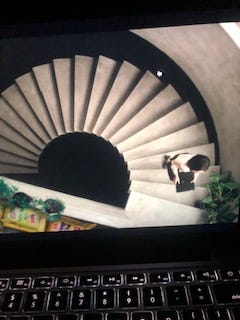The Three: June 2020 Edition
Cultural happenings that caught my eye this month

I hope everybody’s safe and healthy! Thank you so much for reading and sharing. Let’s keep it going, shall we?
Previous editions here and here.
Confronting Systems
A few weeks ago, I devoured both seasons of Homecoming, a show about a wellness center of the same name that ostensibly seeks to help American military veterans ease back into civilian life. In the first season, we meet Dr. Heidi Bergman, the lead therapist at the center who believes that to be the raison d’etre of her work. She will come to learn that it is not quite. The second season builds on the first, exploring the same question of the underlying missions of the institution and its manipulation of trauma and memories. The show is based on a podcast by Gimlet Media featuring Catherine Keener, Oscar Isaac, and David Schwimmer. It’s confidently told, unafraid to unfurl slowly and with great attention to detail.
One of my favorite things about Homecoming is the cinematography, where the attention to detail shows up in their consistent use of neutral tones and how they play with lines and shapes. The look of the show is inspired by 1970s sci-fi cinema, and right from the first frame you can see the visual signature at work. Every so often, we see the camera hover on top of a scene, or linger away from the person talking in a scene. It’s like we’re being constantly reminded that there’s more to what is going on at any given moment that what the character knows or sees. I took some screenshots on my phone, have a look (sorry, it’s not the crispest quality, but you get the idea), but you should really see it for yourself.



There was a great scene where the mother of one of the soldiers came to complain about not being allowed to see her son. Here, we saw the push-and-pull between the intent of an institution and the limited ability of an individual working within it. Dr. Bergman’s good intentions to help veterans like this woman son was suddenly immaterial, and we see more clearly than we have previously that she is a mere vehicle through which the institution of Homecoming achieved its aims, aims which she was not fully awake to at the time. We see her make that realization, too, and learn how it propels her towards the actions she takes that drives the first season towards its shocking conclusion.
The show examination of systems and the power and/or lack thereof of individuals within them speaks well to our prevailing cultural moment. Engaging with the idea and power of cultural systems provides an alternate frame with which to regard everything from rape culture to racism. When you think of #MeToo and #BlackLivesMatter in response not just to individual incidents but to larger systems, it starts to make sense that the Black Lives Matter protests in the US inspired anti-racism protests in France, Switzerland, Belgium, and the UK; and that there is a link between the pulling down of confederate statues in the American South and the pulling down of statues of ruthless figures like King Leopold II in Belgium and those who profited immensely from colonialism and the slave trade in the UK.
In Homecoming, when Dr. Bergman discovered the nature of the system she was contributing to, she chose to forget. As more and more non-black people are engaging with the impact of white supremacy and the systems it creates, I hope that is not a choice they make. In any case, black and brown people around the world will likely not let them.
Naija Hip-hop Royalty
Illbliss and Jesse Jagz both blessed us with new records that reinforce their credentials as major forces in Nigerian music. Illbliss’ last album Oga Boss came out way back in 2012 and I think is one of the best Nigerian albums of the past decade. It was on this record that he really came into his own, carved a niche for himself and asserted his identity. Jagz’ last record before this one Odysseus was him at his skillful best. With Illbliss’ Illy Chapo X and Jesse Jagz’s Garba, I was really excited to have a listen to see where these men are at now, so far into their careers and with their place in the industry beyond dispute.
Jesse Jagz has those who swear he’s the best rapper to ever bless the mic in Nigeria. I won’t touch that with a ten-foot pole (it’s unnecessary), but I definitely missed him and was looking forward to hearing some new music. Odysseus was a lot less inward looking and serious than the Garba EP. Garba is Jagz’s middle name, and each track of the EP is named for a letter of his middle name. Like Odysseus, Garba starts off on G with some philosophical pondering that will either make you roll your eyes or smile indulgently depending on your mood, then a stripped back instrumental serves as the backdrop for his lyrical dexterity as he reflects on his life. “Stripped back” pretty much describes this EP, and he invites us to let his aura and voice guide us through everything from his reflections on his journey so far. Jagz has always carried Jos on his back, and the track B tells the story of conflict, joy and every day life in his hometown. On R, he tells us of past lovers and how they shape his attitude towards love. A. sees Jagz slip into his dancehall/raggae leanings that we saw circa 2016 when he grew out his locs and sang. What the record lacks in levity he more than makes up for in skillful storytelling. There are only two features on Garba and with no sung hooks, it gives the record an intimate feel.
Illbliss and Jagz both rep their hometowns hard, but that’s about where the similarities end. Where Garba is introspective, Illy Chapo X is more relentlessly outward facing towards Nigeria, Igbo people, or just Illbliss considering his place in the game. Illbliss’ rhymes are deceptively simple and straightforward, but otherwise there’s no sparseness to be seen anywhere on this record. God Made You King is triumphant. Goddess is a flex. Upper Iweka, Bags and Bags, and 40ft Container are all Igbo-branded bombast and hustle mentality. Heal, Country, and Green White Green are so contemporary that Illy may as well have written these songs yesterday, with their invocations of COVID-19, IK Ogbonna’s annoying Quarantine Radio flag spam, and Burna’s rant at young Nigerians when Funmi Akindele got picked up for violating quarantine measures. Johnny Drille carries on his record of playing well with rappers on Remember, dedicated to Illbliss’s deceased family members. Even as he moves from one topic to another, no song on X sounds out of place. Rather, they just show you more and more of who he is.
There’s been a fair amount of conversation about the place of hiphop in Nigeria over the years, but I always think commentators might be overthinking it. Jagz and Illbliss’ enduring appeal tells me that the way hiphop thrives in Nigeria is much the same way every other genre does: by being unafraid to tell our stories. As the eyerolling over alte artists and the virtual hands that Mr. Eazi caught over his “Ghana highlife influenced Nigerian music” comments, we’re not a people who identify with half-stepping when it comes to embracing us. MI contends that “we’re getting killed by the South [Africa]” where hiphop culture on the continent is concerned, but maybe that’s not the point. Maybe the point is for everybody to face their people and do their work.
Reading, Watching, and Listening
I’m a big fan of Stephen Parrish’s Farnam Street’s Knowledge Project podcast. Recently, Parrish did an excellent interview with Bryan Koppelman, the creator of the TV show Billions, on creativity. It’s thoughtful and insightful, tying in spirituality and storytelling. It’s always great to read about a creative’s process, and not in a “do this and you’ll be rich” kind of way, but in terms of what works for them and why. I find the insight is less about the process itself than about how it makes them feel and how it serves them. Instead of necessarily trying to copy other people’s processes, it rather makes me look for something that makes me feel the same way and fits as nicely into my life.
The current cultural moment, globally and in Nigeria, weighs a ton. One thing I’ve found to be a great comfort is (don’t laugh) watching cooking shows. Think about it: with cooking, you start with raw ingredients and end with a finished product where what you started with is transmuted into something different and — if you’re lucky — better. Even in these times, the promise of that creation is always possible, that the application of heat and salt and all things edible and good can move things from one state to the next, is a beautiful one to me. It’s probably why I’ve been cooking a fair bit myself. I’ve found a lot of joy watching the excellent Chef’s Table on Netflix, which follows the stories of some of the world’s most famous chefs and tells the story of their signature dishes. These stories are always beautifully told, gorgeously shot and with great music. The ones with Mashama Bailey, Asma Khan, and Sean Brock are my favorite. Also check out Salt, Fat, Acid and Heat, the show based on Samin Nosrat’s book of the same name. Unlike other cooking and travel shows where the host’s foreignness is a feature, Nosrat’s is her ability to melt into everywhere we find her, coupled with her infectious joy and passion for food. She speaks Italian in Italy and Spanish in Mexico, seeks out people you often do not see in cooking shows like mothers and old women in the community who tend to be the unsung heroes of local cuisines. We first come across her on Michael Pollan’s documentary series Cooked, and I remember thinking that I hope she gets her own show. I’m glad she did.
Looking for a bit of inspiration? June is the season of soaring speeches and graduations, and COVID has thrown all that excitement of new phases of life into a bit of a tailspin. It was great, though, to read this excellent series in The Atlantic where different people share some reflections on this current moment, some wisdom of how they have dealt with seemingly insurmountable uncertainty in the past, and perhaps even some hope for the future. One of my favorites here is, surprisingly, one from David Brooks. His work in the NYT editorial page has not exactly endeared me to him, but this was great. I also really liked this one from Caitlin Flanagan.
Along the lines of inspiration, I was excited to learn of the Women Writing Africa anthology series. Given all the recent unrest and how women are mobilizing against gender-based violence in Nigeria, I find it comforting to know that women have always come together and have always been up for a fight. This pan-African anthology of letters and other writing shows how women between the 18th and 20th centuries fought colonialism and chauvinism in the church and state. I’m getting it, and you should, too. While we’re on the subject of women and activism, I hope you’ve been keeping up with Dr. Rama Salla Dieng’s interview series on feminist advocacy. Since I posted about it in last month’s Three, she’s done a few more interviews, including one with Cameroonian-French Francoise Moudouthe on her feminist platform Eyala, Nana Darkoa Sekyiama on her popular blog Adventures from the Bedrooms of African Women, and a group of LGBTQI Ghanaian activists on their offline advocacy.
Until next time.

